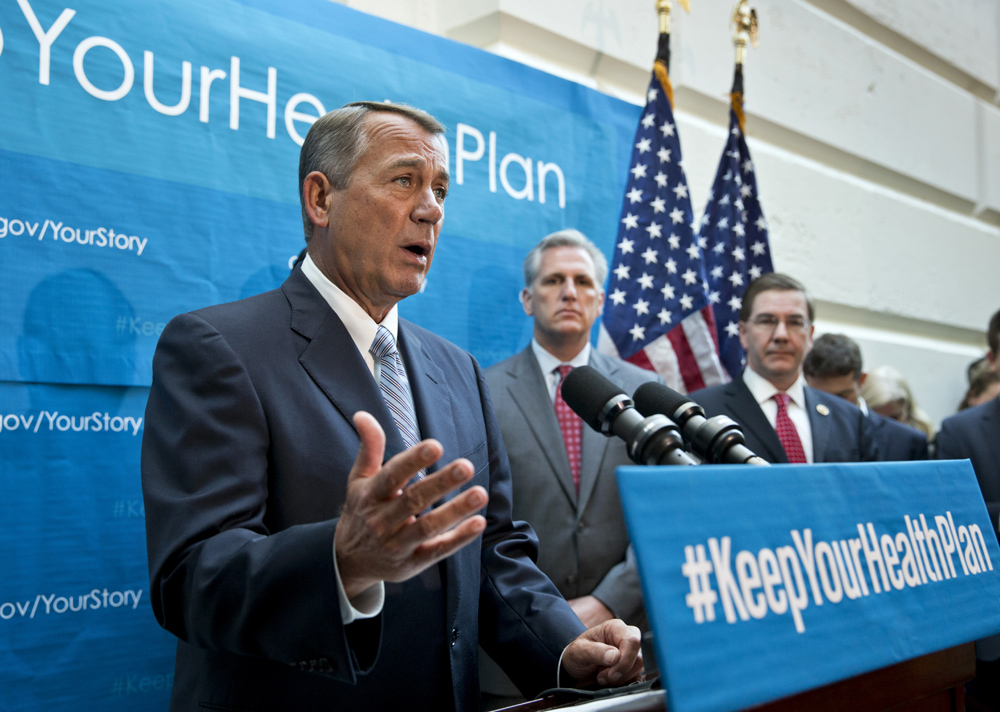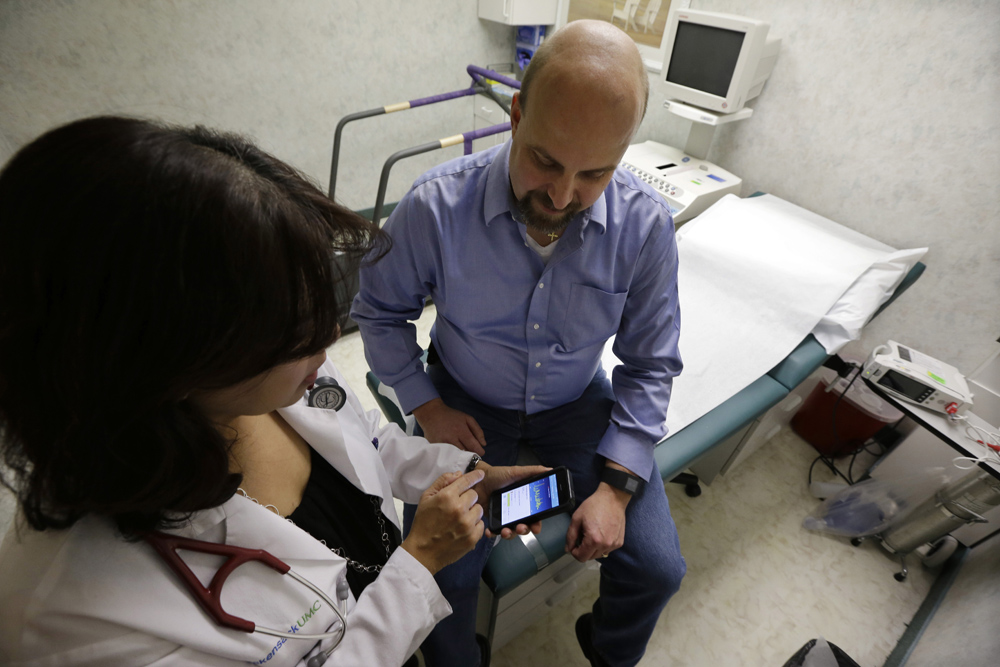Some Supreme Court rulings end conversations, and some start them. The court’s decision on gay marriage is an ending: It caps an era in which public support for marriage equality has undergone a meteoric rise, a development that will likely protect the decision from political backlash. Ask national Republican politicians off the record, and most will tell you they’re relieved to have gay marriage off the table.
But King v. Burwell, the ruling that saved Obamacare, is more of a beginning. If Burwell brings to a close an era in which Obamacare looked reversible, it opens a much more interesting argument, one in which the two parties must compete to shape a national healthcare system that may be the law of the land, but remains deeply flawed and highly malleable. And the key to winning this argument is remembering that Americans have exceptionally short political memories.
In a handful of years, maybe as soon as Election Day 2016, it’s going to be politically irrelevant that Democrats passed Obamacare on nearly party-line votes, or that Republicans spent half a decade working to dismantle it. All that’s going to matter is who can best answer the question: Now what?
Democrats neglect this at their peril. If they decide to take Burwell as permission to rest on their laurels, they’re forgetting the lesson of Ronald Reagan, who made himself a plausible candidate by coming to terms with the legacy of the New Deal, and of Bill Clinton, who rose from political oblivion by co-opting the conservative position on welfare reform.
For 2016, this means that Hillary Clinton is going to be a far less compelling candidate if her position on healthcare amounts to “hands off.” On the Republican said, the key to success won’t be reciting the same talking points that failed to stop Obamacare’s passage, failed to kick its namesake out of office and failed to secure its legal reversal. The most compelling Republican challenger will be whoever makes Obamacare work for the Right.

Republicans have spent half a decade working to dismantle Obamacare. (AP Photo)
Republicans are positioned to win this argument and to retake ownership of the healthcare issue. It boils down to two words that are at the heart of their party’s appeal: personal responsibility.
Obamacare’s dirty secret is that it doesn’t really make us healthier. Ezra Klein, a vocal supporter of the law, wrote this in the middle of the fight over its passage: “Healthcare reform is, in practice, healthcare-system-spending reform. Politicians … do not promise the plans will make everyone healthier, reduce infant mortality or set targets for life expectancy. The health of the nation, as opposed to its ability to pay hospital bills, is hardly under consideration.”
That was true in 2009, and it’s still true today. The objectives of Obamacare were to slow the growth of healthcare spending and to increase the number of insured people, two economic goals that have a limited impact on our health. That’s because the factors that have the largest effect, simple things like eating right, exercising and avoiding risks like smoking, are factors for which we, not the government, bear responsibility. They’re also the factors that do the most to keep us out of the hospital and out of an early grave.
What’s driving our still-rising healthcare costs? According to the Centers for Disease Control and Prevention, 86 percent of healthcare dollars spent in 2010 went toward the care of people with chronic illnesses, such as heart disease, diabetes and the effects of smoking. We know that many, though not all, of these conditions are tied to individual choices: potato chips instead of carrots, driving instead of walking, smoking instead of quitting.
And while the putative villains of our healthcare debate are usually huge institutions — the federal government, insurance companies, or Big Pharma — the root of our rising healthcare costs are millions of small decisions made by ordinary people.

“Healthcare reform is, in practice, healthcare-system-spending reform,” wrote journalist Ezra Klein. (AP Photo)
Those decisions are political now, because Obamacare makes them more political. Obamacare is, among many other things, a system by which the healthy subsidize the unhealthy. That’s long been the premise of insurance, but Obamacare was able to bring millions more people into the insurance marketplace by increasing relative burdens on the healthy.
If your neighbor’s health choices raise your premium or add to your tax bill, you have a real stake in those choices, a stake that is now unavoidably mediated by politics. My good friend, a liberal who voted for Obama twice, put it like this: “I spend lots of hours and lots of money taking care of my health. Because of that, I’m cheap to insure. But on top of that, I pay extra for the effects of other people’s poor health choices.”
Up to a point, there’s virtue in subsidizing the unhealthy. Citizenship requires taking some responsibility for one another, and expanding access to healthcare is one of the ways we’ve chosen to do that. But responsibility goes both ways, and in countries with national healthcare systems, health, to the extent that it’s within our power, increasingly becomes something we owe to one another. If you take care of your neighbor with higher premiums and taxes, it’s reasonable to expect your neighbor to take care of him or herself in return.
The problem is that Obamacare, even as it puts healthier people on the hook, does precious little for the other side of the bargain. My friend looks at Obamacare and sees a system that does little to respect the work he puts into his health, and others see a system that does little to encourage its prime beneficiaries to take their share of responsibility.
It’s true that Obamacare permits higher premiums for smokers; but when that’s the single health behavior it disincentivizes, it’s reasonable to see the law as unfairly singling out smokers as a safe political punching bag, rather than as making a statement about mutual responsibility more generally. It’s also true that Obamacare allows employers and insurers to offer a few small incentives for better health, like cheaper gym memberships. But these programs are small-scale.
More important than the nuts and bolts of policy, though, is what’s absent from our national conversation — the insistence that healthcare is about more than “bending the cost curve,” setting up insurance exchanges and other huge impersonalities. More than any of those, it’s about the ways in which we choose to live, and the fact that not all choices are created equal.

It’s true that Obamacare permits higher premiums for smokers; but when that’s the single health behavior it disincentivizes, it’s reasonable to see the law as unfairly singling out smokers as a safe political punching bag, rather than as making a statement about mutual responsibility more generally. (AP Photo)
In other words, it’s about personal responsibility. Republicans are the voice in our politics that usually stresses personal responsibility, but they’ve been too busy banging their heads against the brick wall of Obamacare to contribute much of anything constructive. As a result, the word “responsibility,” not to the government, but to each other, has been conspicuously missing.
When and if Republicans start making the case, they will have a powerful case to make. In fact, they might borrow the outline of that case from John F. Kennedy. In 1960, while still president-elect, he wrote an essay in Sports Illustrated about the responsibilities of fitness that still resonates today: “No matter how vigorous the leadership of government, we can fully restore the physical soundness of our nation only if every American is willing to assume responsibility for his own fitness and the fitness of his children.
“We do not live in a regimented society where men are forced to live their lives in the interest of the state. We are, all of us, as free to direct the activities of our bodies as we are to pursue the objects of our thought. But if we are to retain this freedom, for ourselves and for generations to come, then we must also be willing to work for the physical toughness on which the courage and intelligence and skill of man so largely depend.”
This isn’t the blueprint for a Mayor Michael Bloomberg-style nanny state. It begins with a recognition of freedom, and continues with the truth that the freedom of responsible adults takes work.
If Republicans decide that they have something constructive to add to the healthcare debate, that’s just the kind of argument they could make. And when the scale of the federal government and the healthcare system makes ordinary people feel insignificant, it’s the kind of argument that can stand out: You can take ownership of your health, and public policy should reflect that commitment. If you do take care of yourself, you deserve to benefit. And if we want to fix our healthcare system, let’s fix ourselves first.
Public policy can reflect that commitment by pushing for stronger incentives, such as tax credits, lower premiums or lower co-pays for insurance customers who take care of their health, and for disincentives for those whose health choices impose high costs on the rest of us. This isn’t an automatic sell to voters, but as long as we’re going to have a national healthcare system, Republicans might say, let’s push it in the direction of tested values like fairness, accountability and self-reliance.

The objectives of Obamacare were to slow the growth of healthcare spending and to increase the number of insured people, two economic goals that have a limited impact on our health. (AP Photo)
To be sure, engaging with the reality of Obamacare is not an easy sell to the current crop of Republican presidential contenders. And even if that hurdle can be overcome, other things stand in the way of a serious discussion of a responsibility-centered healthcare system. Here’s how two of those obstacles can be overcome.
The first is the proper role of technology. Smartphones, smartwatches and fitness-tracking gadgets give us, and insurers, unprecedented access to data about our health behaviors. An iPhone can help track body mass index, flights of stairs climbed, number of REM cycles and much more. Access to that kind of data can be a blessing and a curse.
Consider the positive side. My insurance company, Oscar, is a start-up in New York that’s testing how to use technology and incentives to promote better health. They’ve provided me with an app that tracks the number of steps I take, and if I hit a sufficiently high target each month, I get a refund on my premium. I’m happy to let Oscar know how many steps I walk. I’d share my BMI and calorie intake with them, too, because I like saving money for something I’m already doing anyway. But, crucially, I’m happy to share this information because I’ve opted into it.
But the same technology that makes it possible to reward better health choices also makes possible an Orwellian level of personal monitoring, one that could become less and less optional if it profits insurers. That’s why it’s crucial that a personal-responsibility approach to healthcare lean heavily on incentives, respect freedom of choice and prevent violations of privacy. And that’s why it’s essential that Republicans start participating constructively in the healthcare debate, because they, especially libertarian-ish younger Republicans, are most likely to draw the line at too much invasiveness.

Smartphones, smartwatches and fitness-tracking gadgets give us, and insurers, unprecedented access to data about our health behaviors. (AP Photo)
Second, when it comes to health choices, no one is an island. As important as personal responsibility is, it matters whether we live in a “food desert,” whether our neighborhood is walkable, whether heavily-subsidized junk food is the only option that looks affordable at the store. Choices matter, but the choices we have available are also shaped by public policy. In other words, any politician who runs on this platform is vulnerable, rightly or wrongly, to accusations of victim-blaming. How could a Republican running on responsibility counter those accusations?
For one, there’s no law that says Republicans have to oppose cost-efficient investments in public health. Any party worried about keeping down the deficit ought to be open to up-front spending on things that return multiplied healthcare savings down the road. But more importantly, a competitive Republican candidate will have a principled response ready to any kind of attempt to frame personal responsibility as victim-blaming.
Not everyone has the same resources, but everyone has the power to choose wisely when it comes to health, and a truly inspiring president would offer challenges rather than excuses. To paraphrase something the philosopher Robert Nozick wrote: Liberalism offers ordinary people dignity with one hand, but if it refuses to hold them accountable for their choices, it takes away their dignity with the other.
Americans have always responded to leaders who honored their dignity and their self-reliance. It’s not too late for a healthcare policy that embodies those values. In fact, that conversation is just beginning.
